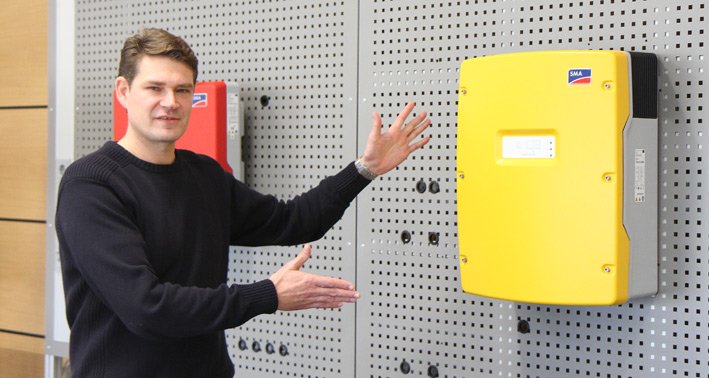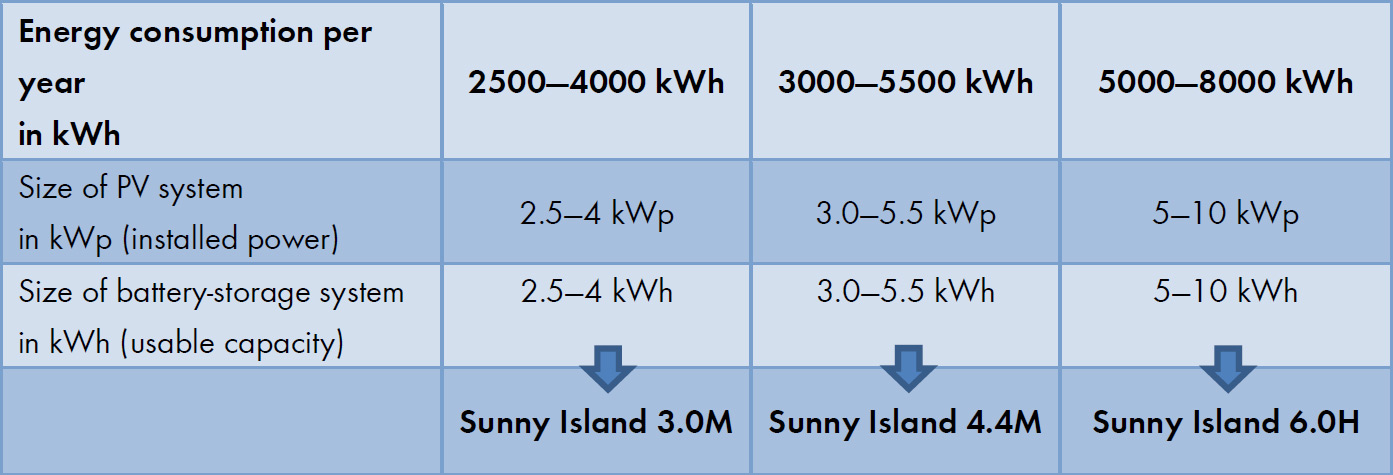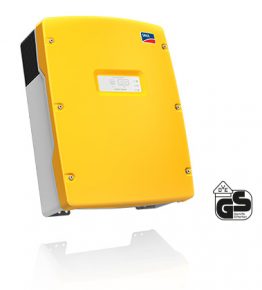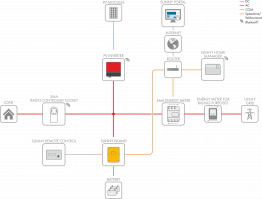For Greater Independence and Reduced Electricity Costs: Sunny Island 3.0/4.4M

SMA Product Manager Ralf Rietze has assisted with the introduction of the new Sunny Island. In an interview, he introduces us to the new addition to the battery inverter portfolio.
The new Sunny Island 3.0/4.4M is suitable for grid-connected systems to reduce electricity costs and for use in remote regions with no grid connection. What exactly does that mean?
The new Sunny Island battery inverter can be installed in both self-sufficient off-grid systems, i.e., off-grid as well as in grid-connected applications with an existing utility grid (on-grid). In off-grid applications, the Sunny Island in combination with a battery forms the core of an autonomous electricity supply and, in addition to the integration of PV systems, also makes it possible to control other energy sources such as diesel generators, water or wind turbines. Off-grid hybrid systems of this kind are typical of rural regions without electricity supply. When used as a solution in a grid-connected area, the Sunny Island provides the link between a utility grid and the battery. Intelligent and automated management maximizes self-generated PV electricity for self-consumption so that less electricity is obtained from the utility grid. The devices can therefore be used for both applications. The only differences relate to the accessories required and the configuration of the devices.
With regard to grid connection, how can I use Sunny Island in my own home?
Just like the larger Sunny Island 6.0H/8.0H, the new Sunny Island can be incorporated as a core component into the SMA Flexible Storage System, the variable SMA storage solution in the SMA Smart Home. The SMA Flexible Storage System is the key to making your own energy transition and putting a stop to high electricity costs. Together with the battery-storage system and PV system, the new Sunny Island 3.0/4.4 make it possible to meet over 80% of annual electricity demand through solar power from your own roof. The surplus energy not used during the daytime is stored in the battery and is available to cover energy needs during the night. The Sunny Home Manager provides grid-optimized charging, meaning it minimizes, for example, derating losses resulting from any restriction on feeding into the grid. In addition, it enables intelligent and automatic load management. Assessment of results is possible via the Sunny Portal at any time, allowing customers to closely monitor energy flows.

The table shows which Sunny Island, battery storage capacity and PV system size are appropriate depending on the annual power consumption level (kWh).
The SMA Flexible Storage System can be optionally installed with a battery-backup function, so that even in case of a power outage, the solar energy currently being generated and stored can be used. With sufficient solar irradiation, a permanent electricity supply is ensured almost without restrictions. The customer has flexibility here in the choice of battery storage system, PV system size, PV inverter and battery inverter. In addition to the battery type (lead or Li-ion), the battery manufacturer and the battery capacity can also be designated. This ensures that a suitable replacement battery will be always available in the future. The product safety of the Sunny Island is confirmed by the “Certified safety” seal of approval from an independent certification body.
How can I use the Sunny Island in the off-grid area?
“Off-grid” it is mainly used in places where there is no access to the utility grid. In these regions, it helps to build a stable and reliable stand-alone grid. The PV system operators benefit from great variety and flexibility in terms of power and the merging of different energy sources to form an off-grid hybrid system. In this way, the system can be precisely tailored to customer needs to ensure that locally available and economical energy sources are always the ones used. As a stand-alone grid manager in off-grid applications, the Sunny Island will safely control all energy sources incorporated within the stand-alone grid. It can, for example, automatically start and stop a diesel generator if required by the connected load or the battery state of charge (SOC). The figure shows a single-phase Sunny Island system, which, in addition to the PV system, integrates a wind turbine, a diesel generator and a direct current charge controller (Sunny Island Charger). In the off-grid area, the new battery inverters stand up particularly well as a result of their robust design and excellent overload capacity. The high degree of protection IP54 and wide temperature range ensure that it operates continuously and reliably even in harsh ambient conditions. The sophisticated battery management system also ensures a long battery life, which ultimately has a positive effect on the operating costs of the entire system.
Your conclusion as a product manager: What is special about the new Sunny Island, and why should potential PV system operators choose it?
 The new Sunny Island 3.0/4.4 are designed for low power ratings of up to 4.4 kW for single-phase and 13 kW for three-phase systems: This means that they offer perfect solutions for various applications in the lower power range. Sunny Island also provides customers with the maximum level of flexibility. Firstly, the battery size, battery manufacturer and battery type (Li-ion or lead) are freely selectable. Secondly, the battery storage system is suitable for both new and existing PV systems; the existing systems can also include external inverters. Thirdly, sophisticated battery management ensures a long battery life and reliable operation. The design of the PV system sizes and installation as either a single- or three-phase system are an advantage for both on- and off-grid operation. Irrespective of whether the Sunny Island is used to optimize the independent electricity supply in the user’s own home or for off-grid applications, with the Sunny Island, customers get a reliable and future-proof complete solution—and all tailored specifically to their installation design.
The new Sunny Island 3.0/4.4 are designed for low power ratings of up to 4.4 kW for single-phase and 13 kW for three-phase systems: This means that they offer perfect solutions for various applications in the lower power range. Sunny Island also provides customers with the maximum level of flexibility. Firstly, the battery size, battery manufacturer and battery type (Li-ion or lead) are freely selectable. Secondly, the battery storage system is suitable for both new and existing PV systems; the existing systems can also include external inverters. Thirdly, sophisticated battery management ensures a long battery life and reliable operation. The design of the PV system sizes and installation as either a single- or three-phase system are an advantage for both on- and off-grid operation. Irrespective of whether the Sunny Island is used to optimize the independent electricity supply in the user’s own home or for off-grid applications, with the Sunny Island, customers get a reliable and future-proof complete solution—and all tailored specifically to their installation design.
Thanks a lot, Ralf, for the answers.
More information
The new Sunny Island 3.0/4.4M have been available for delivery since mid-November 2014. For more information, visit our website.




I have a 3324 ,new never used ,it was just kept in the box ..
I have tried very hard to find the information on this inverter that I need .
I know it is bidirectional .
I know what power it is designed to put out ..
Yet if this power is not enough ,will it take the extra power required from the grid connection ..
Can I control the power that it will supply ….e.g….2000 watts limited ,from the batteries ..3000 watts bypassed through the grid …
I have about 6000watts of solar through mini central’s ,so during the day ,but not every day it would not be required .
But at evening or night ,if I needed to cook I might need more than 3300 watts …
The manual says to fit a 16 amp fuse to the circuit ,yet on a good day this would blow ,from the solar exported .
There is a much higher limit on what might pass through the inverter of over 60 amps ….but I do not understand how this could be ,with 16 amps liming fuse .
I would appreciate your dialogue ,on these things …
I am retired now ,but about ten years ago I was designing solar installations of all sizes ,useIng mainly your inverters …
But For all my studying this 3324 manual I can not fully grasp ,what is possible using it ….
thank you for your time in advance …
Hello Martin,
Sorry to hear about your technical problems.
Please contact our SMA Service for further support as we need more detailed information.
Thanks for your understanding.
Sunny regards
Christiane
how do i get firmware update for sunny island 3324 lithium battery.
Hello Craig,
Please get back to our SMA Service for further support.
We need additional information to assist you here.
Sunny regards
Christiane
SI4.4 Max power is 4.4kw for 30 mins, but what is it’s continuous power rating, 2kw?
Have SMA updated this for use with LiFePo4 batteries? If this item can not accept LiFePo4 then it’s out of date. Can the battery charger be turned off, so I can use it with an external LiFePo4 battery charger?
The big question is will it work with my washing machine and dish washer, or do I have to buy a “Low Frequency” inverter?
This is an old inverter now (2022), is there a newer version?
I really want to buy, but every time I email SMA with a simple question I get no reply, or I get shown the link to the manual, but no answer to any of my question. The manual is written in very bad English. 5 words used when one would suffice. Over the top, designed to confuse.
Hello Bear,
Sorry for the delayed feedback due to our annual leave for Christmas.
Unfortunately you are not satisfied with our feedback so far.
The article you are refering to is outdated in the meantime.
For that reason, links are not working due to updates.
Please get back to us with more information regarding the region you are looking for support so that we can take special care of your inquiry.
First of all, you can find the latest information on our Sunny Island battery inverters here.
In case you need direct technical support, please contact our SMA Service via our SMA Online Service Center.
Sunny regards
Christiane
Hello, I am in the UK.
I have spent a lot of money buying this inverter, and it will not run with lifpo4 batteries, therefore I have to turn the internal battery charger off, and use an external lifepo4 charger. Here’s the simple question, Can I turn off the charger in the SMA 4.4?
I have looked at both of the links and they do not answer my question.
If the battery charger will not be turned off, then I have wasted my money and time.
Hello Bear,
Please get back to my UK-colleagues for further support.
Sunny regards
Christiane
Hi all
I want to know if I should combine SMC 9000TL with SI 5048 to operate my load. or I can use SMC 9000TL and SI5048 separately.
best Regards
Ali
Hello Ali,
Please get back to our SMA Service via our SMA Online Service Center for further support.
Sunny regards
Christiane
Dear SMA Team,
I am located in Mauritius.
I have 5KW capacity of solar panel on roof, sunny boy 5kw inverter, sunny island 4.4, 5Kwh Lithium battery to be installed in a house which will no longer be using grid electricity.
I would like to know if during the day, only the sunny island will be able to cater for the energy need whereas at night the sunny island and battery will take over?
Thank You
Avinash
Hi Avinash,
Thanks for your request.
Please contact your installer or sign in on our Online Service Center for help.
Kind regards,
Anke
Hello,
If I have a three-phase utility grid connection, a PV array and Sunny Tripower and 3 x Sunny Islands and batteries with capacity for 3 days (No sun, no utility grid) – Can I also connect a three-phase diesel generator for additional backup for long periods?
Best regards,
Hi Matt,
unfortunately, it is not possible to connect an additional generator on a OnGrid-system with backup function.
Regards, Lucas
Hi,
We want to use Sunny Island 3324 and Sunny Island 5048 in our projects with sunny boy inverters to form systems connected to Power Grid with battery back up. I see in SI5048 manual that it can feed the grid or work by a generator but these subjects wasn’t in Si3324 manual,so I’m asking if the Si3324 dosn’t have these abilities or I’m wrong.please let me know.
and I have another question that for a system with below components
SB3000 TL
SI3324
1600Ah battery
and 2940 watt solar panels
and like above,connected to the grid with battery back up
do I have to use a switch box or something else.
thanks for your consideration.
Can the Sunny Island be made to charge from PV during the day, and also charge from Economy 7 grid electricity during the night (ie but NOT to charge using standard grid power during the day)?
Hi Mike,
Of course, the Sunny Island is able to charges the batteries during the day with PV surplus. A possibility to use flexible electricity tariffs is already implement in our system solution “Flexible Storage System”.
The necessary intelligence will provide by the Sunny Home Manager. Especially at Summer 2016 SMA will release a new firmware for the Sunny Home Manager which supports the direct use of flexible electrify tariffs in combination with storage.
Regards,
Julia
Thank you. Most helpful. Another question – the SMA Energy Meter. I have SINGLE phase, but I exceed 63amps quite often. My incoming main is split to TWO consumer units in the same location. Can I run ONE of the split Lives into the L1 and the OTHER split Live into L2 on the energy meter? (I know I can use external transformers instead, but I think my idea will work and it will be easier for me to implement)
Hi Mike,
In general, the SMA Energy meter can be used in one-phase or three-phase installations. For applications higher than 63A, current transformers must be connected to the Energy Meter,
as you have mentioned in your previous entry. The SMA Solar Technology AG recommends current transformers designed for a secondary current of 5 A. The current transformers should have at least accuracy class 1.
Please kindly understand that we have not tested our SMA Energy Meter in a similar constellation like yours. Therefore, an accurate measurement cannot be guaranteed.
SMA recommends to use the SMA Energy Meter only in accordance with the information provided in the documentation. Any other use can result in personal injury or property damage.
Kind regards,
Julia
Hello,
What is Sunny Island 3.0 capacity in self-consumption configuration?
What happens if my electric consumption is higher than Sunny Island capacity?
Thank you
José
Hello José,
The Sunny Island 3.0 M-11 is only the battery inverter without an internal battery.
You can connect lead-acid battery or lithium battery with a nominal voltage of 48V to the battery inverter Sunny Island 3.0 M-11.
If the loads in the installation are higher as the maximum power of the Sunny Island than there is a consumption form the public grid.
Best regards,
Julia
Hello Julia,
Thank you for your answer.
In self-consumption configuration, what is the maximum power of the Sunny Island 3.0M and Sunny Island 4.4M?
Best regards,
José
Hello José,
In self-consumption configuration the maximum power of the Sunny Island SI3.0M-11 and SI4.4M-11 is respectively the nominal power.
For the SI3.0M-11 it is 2300W and for the SI4.4M-11 it is 3300W.
Best regards,
Leonie
Dear Reader
Whats the price for the battery unit
Best regards
Peter
Denmark
Hi Peter,
please have a look at Facebook.
Thanks and best regards,
Sarah
Good stuff! Its nice to hear that Li-on and Lead batteries are accommodated. It has been my experience that lead-acid batteries don’t like intermittent charge/discharge cycling during the solar day as it considerably shortens battery life? Presumably, the battery is full before releasing it to the evening load?
Hey John,
if you have further questions on this topic please contact our Service Line or write them an email. That would make it more easier.
My colleagues would be happy to explain and discuss this topic with you. https://www.sma.de/en/service/contact/contact-form.html
Best regards and have a nice x-mas holiday
Leonie